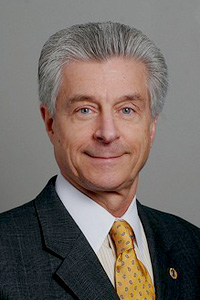Graham Cancer Center shows the power of collaborative multidisciplinary care


A diagnosis of throat cancer two years ago turned the tables on retired health psychologist Barbara Briggs, 69, of Newark, Del.
“My experience as a health professional caring for patients could not have prepared me for the apprehension and anxiety I felt as the patient myself,” Briggs said.
Sitting down with her head and neck cancer multidisciplinary care team (MDC) at the Helen F. Graham Cancer Center gave Briggs the sense of security and direction she needed to focus on next steps toward recovery.
“Although the message was overwhelming, I left the meeting knowing I was getting the best, scientifically based treatment with access to all the support services I might need, and that my nurse navigator was someone I could contact any time to help me get through it all,” she said.
Patients often are unable to process all the information they receive at their first MDC meeting. But each patient has a personal guide through the cancer treatment process—a cancer nurse navigator.
“I’m here to reinforce, listen, comfort, answer questions coordinate appointments and help patients any way I can,” said Nurse Navigator LaTonya Mann, RN, OCN. The journey through treatment and survivorship typically takes six to nine months, but she tells each patient, “I’m here until you tell me you no longer need me.”
Briggs’ treatment plan was complex, requiring multiple consultations with specialists. Her MDC team helped her to overcome struggles with a feeding tube and an infection that required a lengthy stay in the hospital and in a nursing home. She relied especially on the help of her social worker, dietician and health psychologist.
“It took a while to begin to feel like myself again,” she admits. “The entire team at the Graham Cancer Center helped me get there, and I am truly grateful.”
Briggs is now a member of the Helen F. Graham Cancer Center Patient Advisory Board and a Helen’s Ambassador, helping other cancer patients. “I think my experience may give others some comfort to know they are not in this alone,” she said.
A decade of MDCs

“As cancer treatment becomes increasingly complex, it is critical that we streamline the process so patients spend less time waiting for a treatment plan, and less time and energy accessing care and services,” said Nicholas Petrelli, M.D., Bank of America endowed medical director of the Helen F. Graham Cancer Center.
This vision has not only guided the development of the cancer program at Christiana Care; it has influenced cancer care nationally. In its fifth year as a National Cancer Institute (NCI) selected community cancer center, the Helen F. Graham Cancer Center continues to shape NCI National Community Cancer Center Program (NCCCP) initiatives.
Christiana Care began implementing multidisciplinary disease-site centers (MDCs) more than 10 years ago.
“Over the last decade we have successfully deployed 14 MDCs to address this need,” Dr. Petrelli said. “Through our leadership roles with the NCCCP, we have enthusiastically shared the many lessons learned with other participating institutions.”
The first MDCs — head and neck, thoracic and general oncology — began at the Graham Cancer Center in 2002. Today, MDC teams provide care and support to at least half of the 3,300 cancer cases diagnosed or treated annually at Christiana Care. Some 40 physicians, seven nurse navigators and hundreds of health professionals support the MDCs.
“The multidisciplinary forum for treatment has become the standard for leading institutions around the world, leading to a new level of care for patients in our community,” said head and neck surgeon Robert L. Witt, M.D. Participation by a comprehensive multidisciplinary core of physicians and specialists is essential, he said, given the multiple primary treatment modalities that exist for head and neck cancers.
Modeling excellence in care
Participants in NCCCP programs from across the country have made more than 30 site visits to the Graham Cancer Center to observe MDCs in action, said Patricia Strusowski, MS, RN, clinical director of the cancer program and chair of the NCCCP Quality of Care Committee. Strusowski assists other community cancer centers that want to develop their own MDCs, “which do not all look alike,” she said.
The NCCCP Quality of Care Committee’s working group developed an assessment tool as a guide for cancer centers to measure performance. In addition, Graham Cancer Center staff provides Web-based educational programming for nurse navigators, essential components of the MDC model.
MDCs at work
MDCs provide the means for an entire team of health professionals to work together to provide comprehensive, coordinated, best-practice cancer care and support services tailored to the patient and the type of cancer. Studies show that patients do better in this type of multidisciplinary care setting.
MDCs shorten time to treatment and enable the medical oncologist, surgeon and radiation oncologist to coordinate and communicate their recommendations directly to the patient and family at a single visit. A certified oncology nurse navigator collaborates with the physicians to develop a coordinated plan of care and helps navigate patients through the process from start to finish. The team also includes social workers, health psychologists, nutritionists, genetic counselors, rehabilitation specialists, pastoral care professionals and financial counselors.
MDCs also encourage participation in clinical trials. A clinical research nurse at each MDC explores avenues for potential cutting-edge treatments. Currently 24 percent of patients at the Helen F. Graham Cancer Center participate in clinical trials — well above the national average.
The MDC model promotes collaboration with other hospitals to coordinate timely, quality care for patients closer to home. One example is the Young Adult Follow-Up MDC, which in partnership with Nemours/Alfred I. duPont Hospital for Children provides long-term follow-up care for adults who were pediatric cancer patients.
MDCs also help to promote and monitor compliance to best-practice standards, ensuring that patients get the most advanced scientifically based screening, diagnosis and treatment.